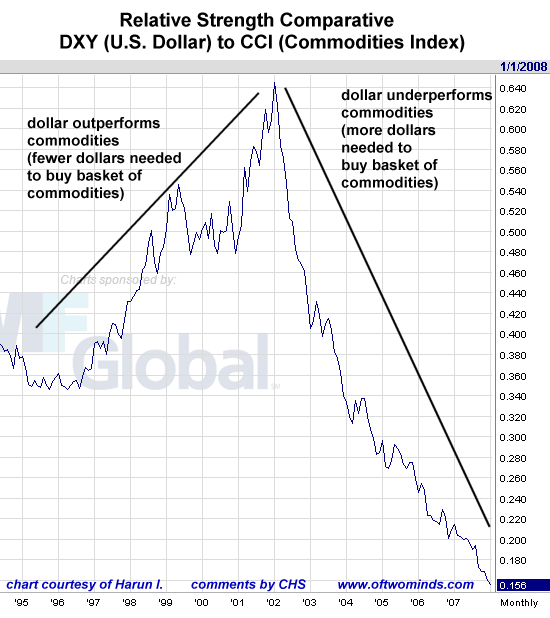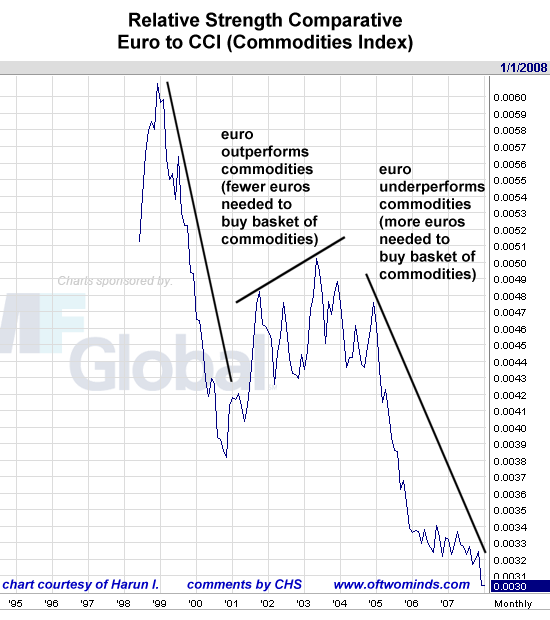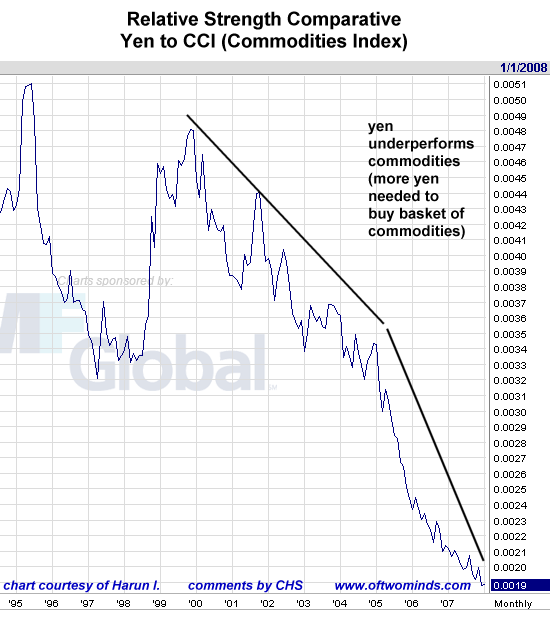

|
| weblog/wEssays archives | home | |
|
Does It Really Matter What Currency You Own? (January 14, 2008) Is the trick to preserving purchasing power to put your money in a currency other than the dollar? Perhaps; but as frequent contributor Harun I. reveals, that's certainly not true of the globe's two other major currencies, the euro and the yen. The latest talk seems to revolve around which currency one should own. I have gone over this ad nauseam but to no avail. Against the basket of commodities (you know, the stuff we must consume to live) know as the Continuous Commodity Index (CCI) the major components of the USD index, the Yen and the Euro, are tanking in purchasing power at the same rate as the Dollar. What this means for the fiat currency system will only be know as a matter of history but the charts suggest it may not be good. 


Is there anything on the horizon which could change the trend? How about a global recession and some decent weather in grain-growing areas? As I have suggested here before, I foresee a recession of such depth, magnitude and speed that oil demand will fall so hard and fast that there will be a global surplus of oil, causing prices to plummet in half or perhaps even 2/3 back to $30/barrel. Grain supplies have been stretched by rising demand and extremes of weather/low yields. Perhaps demand for meat won't drop much in the U.S., but as workers get laid off by the thousands in developing nations, those families will be eating less meat, cutting demand for grain. Toss in a bumper crop here and there, and wheat could fall from $10/bushel to $2/bushel in a relatively short period of time. If China slows its hyper-active building after the August 2008 Olympics, the demand for cement, steel and copper could drop enough to send prices spiraling downward. As the price of gasoline plummets along with global demand for oil, ethenol won't be seen as such a panacea, and corn could suddenly be in surplus again, forcing prices down. Just to widen the speculation to currencies, consider what would happen if any one currency were perceived to be "safer" than the others. What currency that might be--the yuan, the yen, the euro or the dollar--depends on just how roiled the global financial markets become, and which central bank is debasing their currency less than the rest. Severe social disruption could also quickly undermine the perception of a currency's value; indeed, the survival of the euro itself will become doubtful if the great central bank divide between Germany and Everyone Else widens. Or perhaps commodities will slowly begin to be priced in ounces of gold. Once the Emperor (fiat money) has been revealed as naked, then perhaps some nation somewhere will demand a currency which isn't constantly losing purchasing power. That currency would rise, perhaps with amazing speed, as it becomes seen as a relatively secure store of value which is actually outperforming commodities and other currencies. Could a "flight to safety" cause the dollar to reverse course and actually outperform falling commodities? Or could the yuan, euro or yen become a "flight to safety" currency? The cliche is that when the U.S. sneezes, the rest of the world catches cold. Perhaps the major currencies will soon reflect the relative fragility of each currency's home economy; if so, whatever economy suffers the least social turmoil and wealth destruction may be rewarded with a currency which actually outperforms sagging commodities. Or maybe the "commodity-super-cycle" adherents are correct, and global demand will barely be dented by a massive, deep, long U.S. recession. Maybe gold will continue its climb to $3,000/ounce and the dollar will continue its depreciation to near worthlessness. Maybe, but the premise that 75% of the global economy (non-U.S. economies) will be utterly unscathed by the sharp decline of the other 25% (the U.S. economy)--this makes little sense when you you look at the huge surpluses the rest of the world runs with the U.S. If U.S. spending tanks, how can that not affect those who have profited from, and indeed, grown to depend on, exports to the U.S.? And if the exporting nations are actually more vulnerable than they seem, then who can say with any degree of certainty that commodites will continue to outperform all currencies? Could one currency suddenly outperform both the other currencies and commodities? As unlikely as it seems at the moment, we should be open to the possibility. Readers Journal has been updated! Check out all the new opinions and reports. This is another banner week of thoughtful, provocative (and even some zany) ideas. Here is but one entry, a fascinating bit of history contributed by Ron Sprouse: FYI regarding the air traffic controller strike. My father was an air traffic controller at Boeing Field in Seattle when he retired, just a short time before the strike. He was an air traffic controller in the Air Force in WWII helping the planes over the Hump in China.Thank you, Harun, Ron and all the other contributors to Readers Journal for your thought-provoking commentaries. NOTE: contributions are humbly acknowledged in the order received. Your name and email remain confidential and will not be given to any other individual, company or agency. Thank you, Kevin L. ($25), for your much-appreciated donation in support of this humble site. I am greatly honored by your contribution and readership. All contributors are listed below in acknowledgement of my gratitude. For more on this subject and a wide array of other topics, please visit my weblog. copyright © 2008 Charles Hugh Smith. All rights reserved in all media. I would be honored if you linked this wEssay to your site, or printed a copy for your own use. |
||
| weblog/wEssays | home |